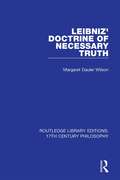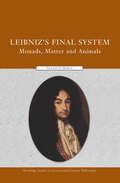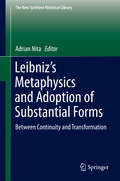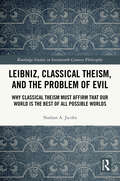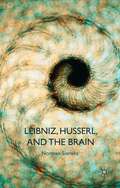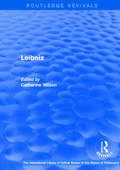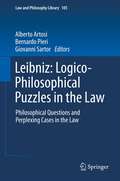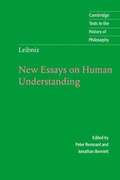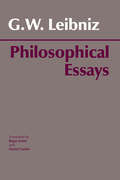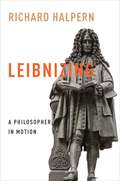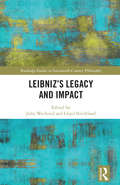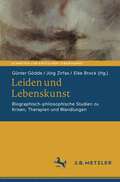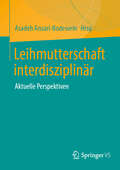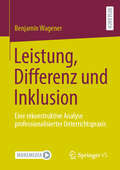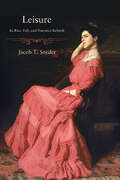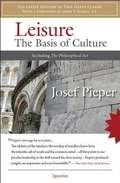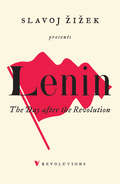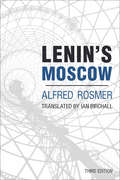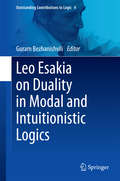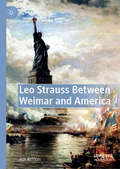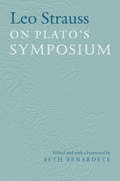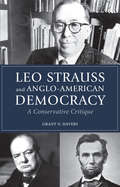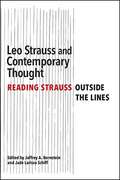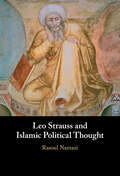- Table View
- List View
Leibniz' Doctrine of Necessary Truth (Routledge Library Editions: 17th Century Philosophy)
by Margaret Dauler WilsonOriginally published in 1990. This study was first written in 1965 when interest in Leibniz was intensifying. The book looks in detail at the doctrine of necessity – that necessary truths are those derivable from the principle of identity by the substitution of definitions. It first considers views of philosophic predecessors, relating Leibniz’ doctrine to Aristotle and Hobbes among others. The second section examines the conflict between his reductionistic and formalistic views and the opposing intuitionism and anti-reductionism of Descartes and Locke. The author critically examines the theory of necessity, including Leibniz’s arguments against the views of Hobbes and Locke, concluding with distinctions between necessary and contingent truths.
Leibniz's Final System: Monads, Matter, and Animals (Routledge Studies in Seventeenth-Century Philosophy)
by Glenn A. HartzGottfried Wilhelm Leibniz was one of the central figures of seventeenth-century philosophy, and a huge intellectual figure in his age. This book from Glenn A. Hartz (editor of the influential Leibniz Review) is an advanced study of Leibniz's metaphysics. Hartz analyzes a very complicated topic, widely discussed in contemporary commentaries on Leibniz, namely the question of whether Leibniz was a metaphysical idealist, realist, or whether he tried to reconcile both trends in his mature philosophy. Because Leibniz is notoriously unclear about this, much has been written on the subject. In recent years, the debate has centered on whether it is possible to maintain compatibility between the two trends. In this controversial book, Hartz demonstrates that it is not possible to maintain compatibility of idealist and realist views - they must be understood as completely separate theories. As the first major work on realism in Leibniz's metaphysics, this key text will interest international Leibniz scholars, as well as students at the graduate level.
Leibniz's Metaphysics and Adoption of Substantial Forms
by Adrian NitaThis anthology is about the signal change in Leibniz's metaphysics with his explicit adoption of substantial forms in 1678-79. This change can either be seen as a moment of discontinuity with his metaphysics of maturity or as a moment of continuity, such as a passage to the metaphysics from his last years. Between the end of his sejour at Paris (November 1676) and the first part of the Hanover period, Leibniz reformed his dynamics and began to use the theory of corporeal substance. This book explores a very important part of the philosophical work of the young Leibniz. Expertise from around the globe is collated here, including Daniel Garber's work based on the recent publication of Leibniz's correspondence from the late 1690s, examining how the theory of monads developed during these crucial years. Richard Arthur argues that the introduction of substantial forms, reinterpreted as enduring primitive forces of action in each corporeal substance, allows Leibniz to found the reality of the phenomena of motion in force and thus avoid reducing motion to a mere appearance. Amongst other themes covered in this book, Pauline Phemister's paper investigates Leibniz's views on animals and plants, highlighting changes, modifications and elaborations over time of Leibniz's views and supporting arguments and paying particular attention to his claim that the future is already contained in the seeds of living things. The editor, Adrian Nita, contributes a paper on the continuity or discontinuity of Leibniz's work on the question of the unity and identity of substance from the perspective of the relation with soul (anima) and mind (mens).
Leibniz, Classical Theism, and the Problem of Evil: Why Classical Theism Must Affirm That Our World is the Best of All Possible Worlds (Routledge Studies in Seventeenth-Century Philosophy)
by Nathan A. JacobsThis volume offers a defense of Leibniz’s theodicy and his infamous claim that our world is the best of all possible worlds. It considers Leibniz’s rationale for “optimism,” examines its roots in ancient and medieval thought, and forwards a novel rereading of Leibniz’s theory of freedom in light of this background, all of which highlights the very real challenges of evading optimism from within the framework of classical theism. Gottfried Leibniz is known for his “theodicy,” or defense of God's Goodness, Wisdom, and Justice despite the realities of evil in our world. This book argues that Leibniz’s optimism is inevitable for proponents of classical theism and even for many not-so-classical theists. The author’s argument is threefold. First, he demonstrates that Leibniz's theodicy is deeply rooted in the classical theist tradition, pagan and Christian, and shows that the philosopher of Leipzig is merely following these commitments to their logical conclusion, a conclusion that long precedes Leibniz. Second, he offers a novel rereading of Leibniz in the light of his philosophical and theological antecedents, a reading that, if correct, dispels ubiquitous but problematic assumptions about Leibniz's case, specifically those about divine and human freedom. Third, he demonstrates the analytic tether that connects classical theism to Leibniz’s conclusion, making his notorious optimism virtually inevitable for proponents of classical theism — and even for not-so-classical theists. This book demonstrates the ways in which Leibniz is relevant to not only classical theists and students of Modern philosophy but also to contemporary philosophers of religion more generally and philosophical theologians who are concerned with the problem of evil. Leibniz, Classical Theism, and the Problem of Evil will appeal to scholars and graduate students interested in Leibniz, philosophy of religion, history of philosophy, philosophical theology, free will, and the problem of evil.
Leibniz, Husserl, and the Brain
by Norman SierokaThis book is about structural relations between phenomenological and neurophysiological aspects of consciousness and time. Focusing on auditory perception and making new and updated use of Leibniz and Husserl, it investigates the transition from unconscious to conscious states, especially with regard to the constitution of phenomenal time.
Leibniz: A Historical And Comparative Study (Routledge Revivals #2422)
by Catherine WilsonThis title was first published in 2001. A collection of previously published essays addressed to Leibniz’s metaphysics, philosophy of science, theories of language and logic, philosophy of mind and theology.
Leibniz: Logico-Philosophical Puzzles in the Law
by Giovanni Sartor Bernardo Pieri Alberto ArtosiThis volume presents two Leibnizian writings, the Specimen of Philosophical Questions Collected from the Law and the Dissertation on Perplexing Cases. These works, originally published in 1664 and 1666, constitute, respectively, Leibniz's thesis for the title of Master of Philosophy and his doctoral dissertation in law. Besides providing evidence of the earliest development of Leibniz's thought and amazing anticipations of his mature views, they present a genuine intellectual interest, for the freshness and originality of Leibniz's reflections on a striking variety of logico-philosophical puzzles drawn from the law. The Specimen addresses puzzling issues resulting from apparent conflicts between law and philosophy (the latter broadly understood as comprising also mathematics, as well as empirical sciences). The Dissertation addresses cases whose solution is puzzling because of the convoluted logical form of legal dispositions and contractual clauses, or because of conflicting priorities between concurring parties. In each case, Leibniz dissects the problems with the greatest ingenuity, disentangling their different aspects, and proposing solutions always reasonable and sometimes surprising. And he does not refrain from peppering his intellectual acrobatics with some humorous comments.
Leibniz: New Essays On Human Understanding
by Gottfried Wilhelm Leibniz Jonathan Bennett Peter RemnantChallenging Locke's views in Essays on Human Understanding chapter by chapter, Leibniz's references to his contemporaries and his discussion of the ideas and institutions of the age make this work a fascinating and valuable document in the history of ideas.
Leibniz: Philosophical Essays
by Roger Ariew Gottfried Wilhelm Leibniz Daniel GarberAlthough Leibniz's writing forms an enormous corpus, no single work stands as a canonical expression of his whole philosophy. In addition, the wide range of Leibniz's work--letters, published papers, and fragments on a variety of philosophical, religious, mathematical, and scientific questions over a fifty-year period--heightens the challenge of preparing an edition of his writings in English translation from the French and Latin.
Leibnizing: A Philosopher in Motion (Columbia Themes in Philosophy, Social Criticism, and the Arts)
by Richard HalpernWhy read Leibniz today? Can we still learn from him and not just about him? This book argues that Leibniz offers a powerful, productive model for transdisciplinary thinking that can push back against the narrowness of the humanities today.Richard Halpern recasts Leibniz as a great writer as well as a great philosopher, demonstrating that his philosophical project cannot be fully understood without taking its literary elements into account. He shows Leibniz to be a prescient thinker about art and beauty whose insights into the relationship between aesthetic experience and thought remain invaluable. Leibnizing asks readers to follow the dynamic movement of Leibniz’s writing instead of attempting to grasp a static philosophical system and to pay careful attention to the rhetorical and stylistic registers of Leibniz’s work as well as its conceptual and logical dimensions.For philosophers, this book offers a novel approach to reading and interpreting Leibniz. For literary and other theorists, it showcases the relevance of Leibniz’s thought to areas from aesthetics to politics and from metaphysics to computer science. Written in a lucid and even witty style, Leibnizing provides readers with an accessible entryway into Leibniz’s sometimes forbidding but ultimately rewarding philosophical vision.
Leibniz’s Legacy and Impact (Routledge Studies in Seventeenth-Century Philosophy)
by Lloyd Strickland Julia WeckendThis volume tells the story of the legacy and impact of the great German polymath Gottfried Wilhelm Leibniz (1646-1716). Leibniz made significant contributions to many areas, including philosophy, mathematics, political and social theory, theology, and various sciences. The essays in this volume explores the effects of Leibniz’s profound insights on subsequent generations of thinkers by tracing the ways in which his ideas have been defended and developed in the three centuries since his death. Each of the 11 essays is concerned with Leibniz’s legacy and impact in a particular area, and between them they show not just the depth of Leibniz’s talents but also the extent to which he shaped the various domains to which he contributed, and in some cases continues to shape them today. With essays written by experts such as Nicholas Jolley, Pauline Phemister, and Philip Beeley, this volume is essential reading not just for students of Leibniz but also for those who wish to understand the game-changing impact made by one of history’s true universal geniuses.
Leiden und Lebenskunst: Biographisch-philosophische Studien zu Krisen, Therapien und Wandlungen (Schriften zur Kritischen Lebenskunst)
by Günter Gödde Jörg Zirfas Eike BrockIndividuelle Überlegungen zur Lebenskunst bieten Orientierungen und Strategien im Umgang mit Krisenerfahrungen in prekären Zeiten. Wer Studien zu Krankheiten und Leidenserfahrungen, Therapien und Wandlungen betreibt, der verschränkt mithin die Lebenskunstmodelle mit den Biographien bedeutender Persönlichkeiten und verdeutlicht damit, wie wichtig der biographische Entstehungskontext für die Modelle ist. Den zentralen Gesichtspunkt bildet dabei die explizite oder implizite Innenperspektive auf die Lebenskunst, auf die mit ihr verbundenen Kategorien und Prozesse, Organisationsformen und Institutionalisierungen und damit auf die Wandlungen und Strukturen ihrer Theorien und Praktiken eines gelungenen Lebens, auf die Erzeugung von Sinn und Glück, den Aufbau von Identität und den Umgang mit den anderen und der Welt. Die hier präsentierte Auswahl an bedeutenden Autorinnen und Autoren der Moderne – von Michel de Montaigne bis Martha Nussbaum – belegt, dass der Ausgangspunkt für Überlegungen zur Lebenskunst in ihren körperlichen, psychischen, sozialen oder kulturellen Krisen bzw. „Krankheiten“ oder Leidenserfahrungen besteht, die wiederum spezifische Lebenskünste zur Folge haben.
Leihmutterschaft interdisziplinär: Aktuelle Perspektiven
by Asadeh Ansari-BodeweinDer vorliegende Band enthält eine Sammlung von Aufsätzen zum Thema Leihmutterschaft aus Blickrichtungen verschiedener Disziplinen, die allesamt jeweils an den aktuellen Forschungsstand anknüpfen. Das Buch wendet sich an Interessierte aller Fächer, die sich mit der kontrovers diskutierten Frage nach einer Liberalisierung von Leihmutterschaftsmodellen befassen und gibt dabei einen Einblick in die Grundlagen der Diskussion in den relevanten Fächern Philosophie, Psychologie, Soziologie, Rechtswissenschaft und Medizin.
Leistung, Differenz und Inklusion: Eine rekonstruktive Analyse professionalisierter Unterrichtspraxis
by Benjamin WagenerWährend der Zusammenhang von sozialer Ungleichheit und schulischem Leistungsprinzip durchaus im Fokus empirischer Forschung steht, stellt die Analyse des Herstellungsprozesses von Differenz und Ungleichheit im Vollzug von Unterricht nach wie vor ein Desiderat dar. Der Zugang zur Unterrichtspraxis setzt wiederum ein komplexes methodisches Vorgehen voraus. Anhand von Unterrichtsvideographien rekonstruiert der Autor unterschiedliche Praxen leistungsbezogener Differenzkonstruktionen in Gymnasien und in Sekundarschulen mit einer inklusiven Programmatik. Die empirischen Ergebnisse, die in der Tendenz auf schulform- und fachspezifische Unterschiede verweisen, reflektiert er im Hinblick auf Professionalisierung in praxeologischer Perspektive sowie mit Bezug auf den aktuellen Diskurs um schulische Inklusion.
Leisure: Its Rise, Fall, and Potential Rebirth
by Jacob T. SnyderLeisure is a genealogy of the concept of leisure, from its peak in the classical age to its inversion and fall in modern liberalism. The goal of this genealogy is to analyze models of leisure and to inquire into the potential future shape of it. In that process, Jacob T. Snyder asks: what was leisure in its peak form in the classical age? In such a form, how was leisure understood to be connected to human flourishing? Then, what happened to leisure? What was the argument for work that won over the West? What must be rejected, or lost, about work if leisure is to be reanimated? In asking and answering these questions, Snyder argues that political reform, such as limiting work weeks, is insufficient to make us leisured. Leisure demands more, including a new understanding of what makes us happy and thriving creatures.
Leisure: The Basis of Culture and The Philosophical Act
by Josef Pieper"One of the most important philosophy titles published in the twentieth century, Josef Pieper's Leisure, the Basis of Culture is more significant, even more crucial, today than it was when it first appeared more than fifty years ago. This special new edition now also includes his little work The Philosophical Act. Leisure is an attitude of the mind and a condition of the soul that fosters a capacity to perceive the reality of the world. Pieper shows that the Greeks and medieval Europeans, understood the great value and importance of leisure. He also points out that religion can be born only in leisure - a leisure that allows time for the contemplation of the nature of God. Leisure has been, and always will be, the first foundation of any culture. Pieper maintains that our bourgeois world of total labor has vanquished leisure, and issues a startling warning: Unless we regain the art of silence and insight, the ability for non-activity, unless we substitute true leisure for our hectic amusements, we will destroy our culture - and ourselves. "Pieper's message for us is plain. . . . The idolatry of the machine, the worship of mindless know-how, the infantile cult of youth and the common mind - all this points to our peculiar leadership in the drift toward the slave society. . . . Pieper's profound insights are impressive and even formidable. "- New York Times Book Review "Pieper has subjects involved in everyone's life; he has theses that are so counter to the prevailing trends as to be sensational; and he has a style that is memorably clear and direct. " - Chicago Tribune"
Lenin 2017: Remembering, Repeating, and Working Through
by V. I. Lenin Slavoj ZizekOne hundred years after the Russian Revolution, i ek shows why Lenin’s thought is still important todayLenin’s originality and importance as a revolutionary leader is most often associated with the seizure of power in 1917. But, i ek argues in this new study and collection of original texts, Lenin’s true greatness can be better grasped in the very last couple of years of his political life. Russia had survived foreign invasion, embargo and a terrifying civil war, as well as internal revolts such as at Kronstadt in 1921. But the new state was exhausted, isolated and disorientated in the face of the world revolution that seemed to be receding. New paths had to be sought, almost from scratch, for the Soviet state to survive and imagine some alternative route to the future. With his characteristic brio and provocative insight, i ek suggests that Lenin’s courage as a thinker can be found in his willingness to face this reality of retreat lucidly and frontally.From the Hardcover edition.
Lenin's Moscow
by Alfred Rosmer Ian BirchallWhen Alfred Rosmer arrived in Russia in 1919 it was considered by millions to be the center of world revolution. It was also a society beleaguered by civil war and encircled by hostile powers seeking to snuff out the promise and potential the first successful workers' revolution represented. It was in this context that revolutionaries from across the globe undertook the creation of the Communist International, hoping to forge an instrument to fan the flames of the struggle against global capitalism.In this gripping political memoir of his time in Moscow, Rosmer draws on his unique perspective as both a delegate to the Comintern-and as a member of its Executive Committee-to paint a stunning and inspiring picture of the early years of Soviet rule. From the debates sparked by the publication of Lenin's State and Revolution and Left-Wing Communism to the efforts of the International to extend its influence beyond Europe with the Congress of the Peoples of the East in Baku, Rosmer documents key developments with an unparalleled clarity of vision and offers invaluable insights.
Leo Esakia on Duality in Modal and Intuitionistic Logics
by Guram BezhanishviliThis volume is dedicated to Leo Esakia's contributions to the theory of modal and intuitionistic systems. Consisting of 10 chapters, written by leading experts, this volume discusses Esakia's original contributions and consequent developments that have helped to shape duality theory for modal and intuitionistic logics and to utilize it to obtain some major results in the area. Beginning with a chapter which explores Esakia duality for S4-algebras, the volume goes on to explore Esakia duality for Heyting algebras and its generalizations to weak Heyting algebras and implicative semilattices. The book also dives into the Blok-Esakia theorem and provides an outline of the intuitionistic modal logic KM which is closely related to the Gödel-Löb provability logic GL. One chapter scrutinizes Esakia's work interpreting modal diamond as the derivative of a topological space within the setting of point-free topology. The final chapter in the volume is dedicated to the derivational semantics of modal logic and other related issues.
Leo Strauss
by Robert HowseExamines the German and Jewish sources of Strauss's thought and the extent to which his philosophy can shed light on the crisis of liberal democracy.
Leo Strauss Between Weimar and America
by Adi ArmonThis is the first book-length examination of the impact Leo Strauss’ immigration to the United States had on this thinking. Adi Armon weaves together a close reading of unpublished seminars Strauss taught at the University of Chicago in the 1950s and 1960s with an interpretation of his later works, all of which were of course written against the backdrop of the Cold War. First, the book describes the intellectual environment that shaped the young Strauss’ worldview in the Weimar Republic, tracing those aspects of his thought that changed and others that remained consistent up until his immigration to America. Armon then goes on to explore the centrality of Karl Marx to Strauss’s intellectual biography. By analyzing an unpublished seminar Strauss taught with Joseph Cropsey at the University of Chicago in 1960, Armon shows how Strauss’ fragmentary, partial engagement with Marx in writing obscured the important role that Marxism actually played as an intellectual challenge to his later political thinking. Finally, the book explores the manifestations of Straussian doctrine in postwar America through reading Strauss’ The City and Man (1964) as a representative of his political teaching.
Leo Strauss On Plato's Symposium
by Leo Strauss Seth BenardeteThe first major piece of unpublished work by Leo Strauss to appear in more than thirty years, this volume offers the public the unprecedented experience of encountering this renowned scholar as his students did. Given as a course in autumn 1959 under the title "Plato's Political Philosophy," these provocative lectures-until now, never published, but instead passed down from one generation of students to the next-show Strauss at his subtle and insightful best.
Leo Strauss and Anglo-American Democracy: A Conservative Critique
by Grant HaversIn this original new study, Grant Havers critically interprets Leo Strauss's political philosophy from a conservative perspective. Most mainstream readers of Strauss have either condemned him from the Left as an extreme right-wing opponent of liberal democracy or celebrated him from the Right as a traditional defender of Western civilization. Rejecting both of these portrayals, Havers shifts the debate beyond the conventional parameters of our age. He persuasively shows that Strauss was neither a man of the Far Right nor a conservative. He was in fact a secular Cold War liberal who taught his followers to uphold Anglo-American democracy as the one true universal regime that does not need a specifically Christian foundation. Strauss firmly rejects the traditional conservative view held by Edmund Burke that Anglo-American democracy needs the leavening influence of Christian morality (love thy neighbor). Havers maintains that Strauss's refusal to recognize the role of Christianity in shaping Western civilization, though historically unjustified, is crucial to Strauss and the Straussian portrayal of Anglo-American democracy. In the Straussian view, the Anglo-American ideals of liberty, equality, and constitutional government owe more to the ancient Greek philosophers Plato and Aristotle than to the Christian tradition. In the process, Havers argues, Straussians end up rewriting history by falsely idealizing the ancient Greeks as the forerunners of modern liberal democracy, despite the Greek toleration of practices such as slavery and infanticide. Straussians also misrepresent statesmen of the Anglo-American political tradition such as Abraham Lincoln and Sir Winston Churchill as heirs to the ancient Greek tradition of statecraft, despite their indebtedness to Christianity. Havers contends that the most troubling implication of Straussianism is that it provides an ideological rationale for the aggressive spread of democratic values on a global basis while ignoring the preconditions that make these values possible. Concepts such as the rule of law, constitutional government, Christian morality, and the separation of church and state are not easily transplanted beyond the historic confines of Anglo-American civilization, as recent wars to spread democracy in the Middle East and Central Asia have demonstrated. This excellent study will be of interest not only to longtime readers of Strauss but also philosophers, political scientists, historians, religious studies scholars, and theologians.
Leo Strauss and Contemporary Thought: Reading Strauss Outside the Lines (SUNY series in the Thought and Legacy of Leo Strauss)
by Jeffrey A. Bernstein; Jade L. SchiffLeo Strauss's readings of historical figures in the philosophical tradition have been justly well explored; however, his relation to contemporary thinkers has not enjoyed the same coverage. In Leo Strauss and Contemporary Thought, an international group of scholars examines the possible conversations between Strauss and figures such as Walter Benjamin, Jacques Derrida, Michel Foucault, Charles Taylor, and Hans Blumenberg. The contributors examine topics including religious liberty, the political function of comedy, law, and the relation between the Ancients and the Moderns, and bring Strauss into many new and original discussions that will be of use to those interested in the thought of Strauss, the history of philosophy and political theory, and contemporary continental thought.
Leo Strauss and Islamic Political Thought
by Rasoul NamaziIn this book, Rasoul Namazi offers the first in-depth study of Leo Strauss' writings on Islamic political thought, a topic that interested Strauss over the course of his career. Namazi's volume focuses on several important studies by Strauss on Islamic thought. He critically analyzes Strauss's notes on Averroes' commentary on Plato's Republic and also proposes an interpretation of Strauss' theologico-political notes on the Arabian Nights. Namazi also interprets Strauss' essay on Alfarabi's enigmatic treatise, The Philosophy of Plato and provides a detailed commentary on his complex essay devoted to Alfarabi's summary of Plato's Laws. Based on previously unpublished material from Strauss' papers, Namazi's volume provides new insights into Strauss' reflections on religion, philosophy, and politics, and their relationship to wisdom, persecution, divine law, and unbelief in the works of key Muslim thinkers. His work presents Strauss as one of the most innovative historians and scholars of Islamic thought of all time.
